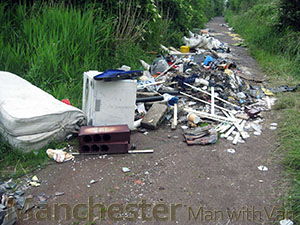 A number of areas in Greater Manchester are suffering from regular fly tipping, and local authorities are taking up the matter with magistrates, asking for tougher penalties. Two recent cases of fly tipping in which offenders got slap-on-the-wrist fines were the catalyst of the situation.
A number of areas in Greater Manchester are suffering from regular fly tipping, and local authorities are taking up the matter with magistrates, asking for tougher penalties. Two recent cases of fly tipping in which offenders got slap-on-the-wrist fines were the catalyst of the situation.
In one case, a man tipped an unbelievably large amount of garden waste in an alley thus blocking access to people’s homes. In result he got a fine of merely one thousand pounds. The other laureate who got caught polluting actually did it on two separate occasions. In order to impress his girlfriend’s dad, he dumped a decent amount of household waste on a green patch in the city was fined only seven hundred and fifty pounds.
Local councils are voicing out concern and agitation with such individuals and the light penalties applicable to this kind of offense. The impact of fly tipping ripples through the community on many levels say local authorities. At the end of the day, it is local taxpayers who pay for cleaning up after such acts.
Currently, the maximum fine for fly tipping in Greater Manchester is fifty thousand pounds, though this has not been handed down to offenders so far. Suggestions are drafted and put through for much steeper fines in order to discipline local polluters and curb this nasty habit once and for all.
Local businesses including retailers, man and van companies, eateries, manufacturers etc. are also in support of the idea and want to see tougher penalties for ‘those people in the city who simply don’t care’. In twenty fourteen, local councils have investigated and prosecuted twenty cases of fly tipping, resulting in fines of over twenty thousand pounds in total. The whole ordeal, from receiving fly tipping complaint to prosecuting the offender costs local taxpayers over hundred and forty pounds a year.
On the other hand, some individuals and businesses including manufacturers and man and van companies say that council waste collection rules and polices need some improvement. Local councils have a no-collection policy for rubbish left on side of bins. This however hasn’t improved habits much and now there are new ideas and suggestions being considered and put into practice.
Residents of areas suffering from fly tipping attribute this negative occurrence to the fact that most local councils, have fortnightly bin collections which means more waste accumulated and longer periods between collections. This doesn’t go to justify fly tipping in any way, but it suggests certain changed to policy will help minimise the problem, if not eradicate it completely. Changes to collection practices i.e. making them more frequent may raise the cost of waste management in the city, but some coordinated thinking together with waste management depots and recycling facilities is likely to offset excess costs.
Fact of the matter remains though, people need to change their attitude toward waste-making and waste disposal. If educating is not enough, then the hefty fines talked about above can prove to be a more suitable solution to this nuisance of a problem.